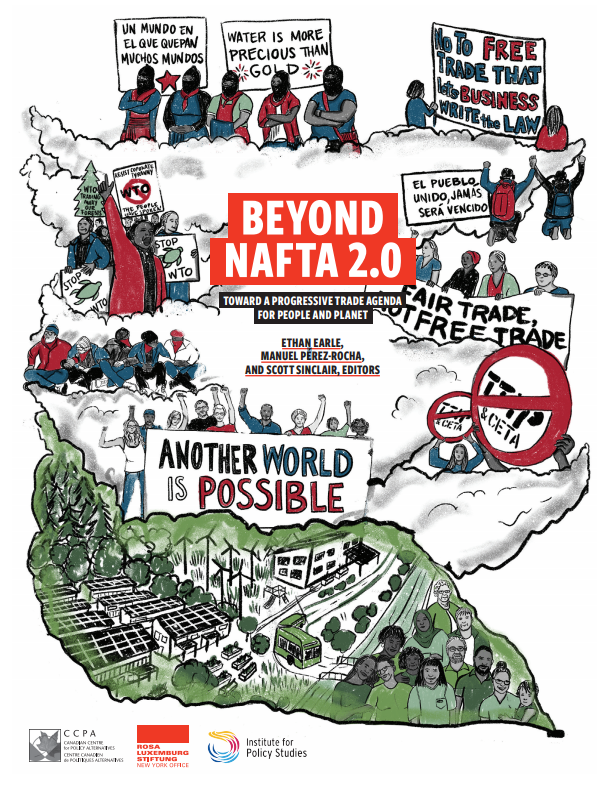Beyond NAFTA 2.0: A Trade Agenda for People and Planet
Manuel Pérez-Rocha | Ethan Earle | Scott Sinclair
Introduction:
With ratification of NAFTA 2.0 still up in the air in the U.S. and Canada, a new international report looks beyond that deeply flawed agreement to imagine a more progressive and truly fair trade regime. The report, which includes contributions by trade experts and activists from all three North American countries, critically analyzes the USMCA (known as CUSMA in Canada and T-MEC in Mexico) and sets out alternatives that would give priority to human rights and the rights of nature over corporate rights.
The report challenges both the Trump administration’s trade wars and the broken, neoliberal status quo. It recommends many practical changes to current trade rules, including safeguarding climate-protecting initiatives from trade challenge; fully eliminating investor-state dispute settlement; enshrining labour, indigenous and gender rights; and exempting public services from trade treaty interference. It also looks at ways to replace excessive intellectual property protections with measures that would encourage innovation while supporting user rights, data privacy and access to affordable medicines.
—
Con la ratificación del TLCAN 2.0 aún en el aire en los Estados Unidos y Canadá, un nuevo informe internacional ve más allá de ese acuerdo profundamente defectuoso y plantea un régimen de comercio más progresista y verdaderamente justo. El informe, que incluye contribuciones de expertos sobre comercio y activistas de los tres países de América del Norte, analiza críticamente el T-MEC (conocido como CUSMA en Canadá y USCMA en Estados Unidos) y presenta alternativas que darían prioridad a los derechos humanos y los derechos de la naturaleza sobre los derechos corporativos.
El informe reta tanto a las guerras comerciales de la administración de Trump como al fracasado status quo neoliberal. Recomienda muchos cambios prácticos a las reglas comerciales actuales, incluyendo el salvaguardar las iniciativas de protección del clima ante los desafíos del comercio; eliminar por completo el sistema de solución de controversias inversionista – Estado; la consagración de los derechos laborales, de los pueblos indígenas y de género; y eximir a los servicios públicos de la interferencia por parte de tratados de libre comercio. También busca formas de reemplazar las protecciones excesivas de propiedad intelectual con medidas que fomenten la innovación, al tiempo que se respalden los derechos de los usuarios, la privacidad de los datos y el acceso a medicamentos asequibles.
Key Findings:
The report’s key recommendations call for future trade agreements to:
- Fully eliminate investor-state dispute settlement (ISDS) mechanisms that allow foreign investors and corporations to contest public policy decisions through private international arbitration;
- Enshrine binding, enforceable obligations to combat climate change and safeguard greenhouse gas reduction initiatives from trade challenges;
- Replace excessive intellectual property rights with balanced rules that encourage innovation while supporting user rights, data privacy and access to affordable medicines;
- Establish a floor of strong, fully enforceable labor rights that enable workers to take complaints to independent international secretariats, which can proactively investigate labor rights abuses;
- Recognize and respect gender and Indigenous rights, including prioritizing women’s employment and economic well-being, and recognizing Indigenous title to land and resources;
- Pursue regulatory co-operation that respects jurisdictional autonomy and aims to harmonize to the highest standards;
- Fully protect the right to preserve, expand, restore and create public services without trade treaty interference; and
- End the current secrecy in trade negotiations and privileged access for vested interests.
- The report strongly condemns the bullying trade tactics of the Trump administration, such as threatened tariffs on Mexican products unless its government cracks down on Central American migrants.

Media Contacts:
Domenica Ghanem
domenica@ips-dc.org
202-787-5205
Alyssa O’Dell
dalyssa@policyalternatives.ca
1 (613) 563-1341 x307 or 1 (343) 998-7575
Manuel Pérez-Rocha
manuel@ips-dc.org
1 (240) 838-6623
